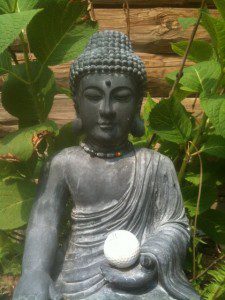It’s almost something of a cliché to point out the life lessons of golf. Many authors have focused on the values of integrity, honesty, fortitude, patience, and many other significant virtues that the game fosters or reveals in people.
 I’ve given a great deal of thought to the psychological and spiritual aspects of golf and have compiled my thoughts in the manuscript (Swing Like You Don’t Care: 54 Golf Axioms, Maxims, and Metaphors).
I’ve given a great deal of thought to the psychological and spiritual aspects of golf and have compiled my thoughts in the manuscript (Swing Like You Don’t Care: 54 Golf Axioms, Maxims, and Metaphors).
When I, like 27 million others in the United States, developed an interest in golf a few years ago, a fellow psychologist asked me if I was applying my mindfulness training to help other golfers. “What a great idea,” I thought! I had been applying mindfulness to the development of my own golf game, but had not yet stepped out to teach others. Shortly thereafter, I started teaching golf clinics on “mind fitness” for golfers.
While applying mindfulness to golf (or any activity for that matter) makes obvious sense, seeing how golf can foster mindfulness may not be so obvious. As I’ve discovered over the years, the relationship is a two-way street. I use mindfulness to improve my golf game and my golf game “uses” me so that I’m more mindful (or not, as the case sometimes is). In fact, I’d go as far as saying that golfing can be a bona fide spiritual path.
OK, you’ll probably want me to back that last statement up a bit, so here goes. Of course we could spend the next hundred years defining what a spiritual path is, so let’s agree to use this working definition: A spiritual path is a set of attitudes and practices designed to foster self-knowledge, growth, and goodness. A spiritual path should bring us into a state of attunement and coherence with ourselves and the world we are inextricably a part of.
How is golfing a spiritual path? Golf is a challenging game. While the professionals on television make it look exceedingly easy sometimes, it is an extraordinarily difficult undertaking. It requires concentration of mind and coordination of body. It can be the ultimate test of mind-body integration because any variance (that is distraction, misalignments, etc.) will produce demonstrably poor results.
For me, golf provides an opportunity to be fully present and engaged in my life in the moment. I can do this outside too in a sea of green shades, wildlife, and waterways (I won’t comment on the environmental impact of golf here, but may in a future entry). Golf demands that I be awake and provides consequences when I am not. The difficulty of playing golf shows me all the places where I am still attached and still in need of spiritual growth. Watching the Masters yesterday was a vivid reminder of golf’s excitement and potential as a path of transformation.
If golf had been around 2500 years ago, I’m sure Siddhartha (the future Buddha) would have played the game and would have played well. Yesterday as the world watched South African, Charl Schwartzel close the Masters birdie-birdie-birdie-birdie, they were witness buddhanature in action. He was fully engaged in the moment, fully attuned with mind and body, and producing incredible results.
Watch the highlights here:
http://www.youtube.com/watch?v=qHCNwoRhEmY

